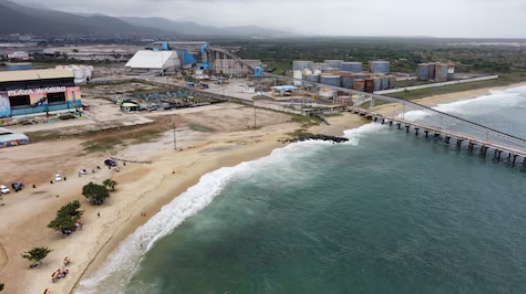Wedoany.com Report-Apr. 2, Venezuela’s crude oil and fuel exports dropped by 11.5% in March due to new U.S. measures affecting its energy sector. The decline followed Washington’s introduction of secondary tariffs and the cancellation of key operating licenses, causing delays and cargo suspensions, according to shipping data and documents. On March 25, 2025, the U.S. announced a 25% tariff on buyers of Venezuelan crude and gas, effective that week. The U.S. also informed foreign partners of Venezuela’s state-owned oil company, PDVSA, that their export authorizations were revoked.
The docks of the Venezuelan state oil company PDVSA subsidiary VOPAK Venezuela are seen on the Waikiki beach, in Puerto Cabello, Venezuela February 10, 2024.
These actions came after the U.S. suspended a vital license for Chevron to produce and export oil from Venezuela to the United States, which was the second-largest market for Venezuelan crude in 2024. The Treasury Department set May 27, 2025, as the deadline for companies to cease operations and exports. As a result, regular buyers in China and India halted some shipments scheduled for late March and April.
In March, 42 vessels left Venezuelan waters, carrying 804,677 barrels per day of crude and fuel, plus 341,000 metric tons of oil byproducts and petrochemicals. This export volume was 7.8% lower than March 2024 and the lowest since December. China remained the top destination, receiving 483,700 barrels per day, followed by the U.S. with 210,700, India with 60,160, and Cuba with 50,130. No crude was shipped to Europe in March, though some European PDVSA partners are loading final cargoes before the May deadline.
The U.S. measures have disrupted logistics, with two vessels departing empty since February and others waiting weeks near Venezuelan ports despite loading approvals. Satellite imagery from Tankertrackers.com showed over 80 vessels in or near Venezuelan waters this week, including 35 loaded but stationary. The U.S. has increased pressure on Venezuela, citing concerns over illegal migration, according to statements from Washington.
Experts predict that if these measures persist, Venezuela’s primary revenue source could suffer significantly in the coming months, similar to the impact of U.S. sanctions in 2020. However, the country may adapt by redirecting crude to Asia via third countries or sea trans-shipments, a strategy used by Venezuela and other sanctioned oil producers in recent years. Despite the challenges, PDVSA continues to navigate the shifting trade landscape to sustain its export operations.

















